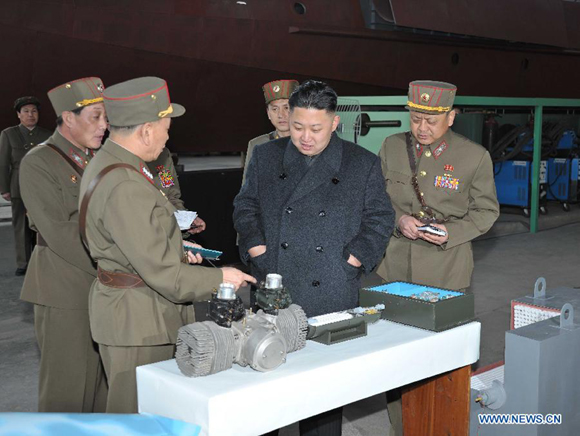US dismisses Pyongyang's fresh threats
 0 Comment(s)
0 Comment(s) Print
Print E-mail Xinhua, March 27, 2013
E-mail Xinhua, March 27, 2013
The Obama administration on Tuesday dismissed Pyongyang's fresh threats of striking bases in the United States and the Republic of Korea as following a pattern "designed to raise tensions and intimidate others."
"North Korea's bellicose rhetoric and the threats that they engage in follow a pattern designed to raise tensions and intimidate others," White House spokesman Jay Carney told reporters at a regular press briefing. "As we say consistently, the DPRK will achieve nothing by these threats or provocations, which will only further isolate North Korea and undermine international efforts to ensure peace and stability in Northeast Asia."
|
|
|
Photo provided by Korean Central News Agency (KCNA) on March 25, 2013 shows Kim Jong Un (C), top leader of the Democratic People's Republic of Korea (DPRK), inspecting People's Army Unit 1501. |
The Democratic People's Republic of Korea (DPRK) said on Tuesday that its strategic rocket and long-range artillery units have been ordered to be combat ready to strike bases "in the U.S. mainland and on Hawaii and Guam and other operational zones in the Pacific as well as all the enemy targets in South Korea and its vicinity."
State Department spokesman Patrick Ventrell refused to say whether the DPRK has the capability, but stressed that the U.S. is "fully capable" of defending itself and its allies.
"And we're firmly committed to the defense of the Republic of Korea and Japan," he said at a regular news briefing.
Pentagon spokesman George Little said Washington is concerned by any activities on the Korean Peninsula that could raise tensions.
"It's not just artillery, North Korea has nuclear capabilities, so the full range of their arsenal is of concern to the United States and to our South Korean allies," Little told reporters at the Pentagon.
He said the decision made earlier this month to beef up the missile defense system by placing 14 additional ground-based interceptors at Alaska and California was based in large part on growing threats from the DPRK.
The DPRK has threatened a preemptive nuclear strike for self- defense and unilaterally nullified the 1953 armistice that ended the Korean War, after the UN Security Council passed unanimously resolution 2094 on March 7 condemning its third nuclear test on Feb. 12 and slapping new sanctions.







Go to Forum >>0 Comment(s)